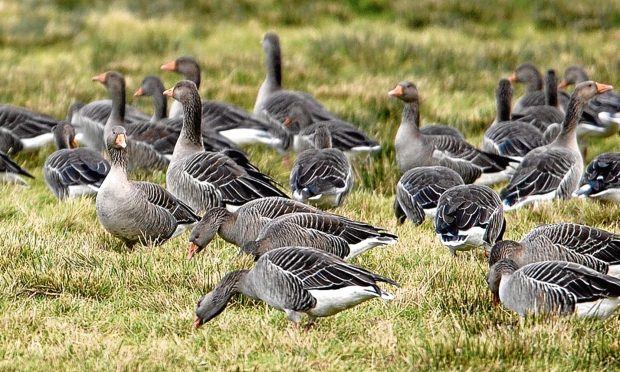Island crofters have been given funding and permission to continue killing geese and selling the meat until the end of the year.
The cull pilot was launched to help farmers minimise the destruction of their crops, due to a rapidly rising population of greylag geese in the region.
Pilot studies have been carried out in communities across Orkney and the Western Isles including Tiree, Coll, Uist, Lewis and Harris in an effort to control the species.
Following its success, Scottish Natural Heritage (SNH) has announced the sale of goose meat and funding for the pilot scheme has been extended until the end of the year to help contain the widespread impact.
Sally Thomas, SNH’s Director of People & Nature, said: “Wild geese are an important part of Scotland’s nature, but their rapid rise in numbers has been challenging for farmers and crofters. We understand it’s still an issue in some areas, with a difficult balance between conservation, farming and hunting.
“Our goal is to give farmers and crofters the tools they need to safeguard their crops, by giving them the control to manage goose numbers sustainably through sport shooting, other control, or selling goose meat for profit.”
This announcement backs demands by the Western Isles Council in 2017 for the scheme to continue stressing it would leave the islands with “no firm sustainable plans to tackle the problem for the future”.
Studies have confirmed that resident greylag goose populations can absorb substantial losses without any effect on their conservation status. Greaylag geese are a quarry species, listed as a species of least concern – not endangered, threatened or vulnerable.
Director of People for the Ethical Treatment of Animals (PETA), Elisa Allen, condemned the “hideous plan” saying: “There are many alternative ways to protect crops that don’t involve blasting these sensitive birds out of the sky. PETA implores officials to cancel this hideous plan – and we ask local residents to respect wildlife by exploring vegan foods, which are kind to animals and better for our health by a mile.”
Meanwhile, Scottish SPCA chief superintendent Mike Flynn added: “As far as we are aware, there have been culls of geese happening for many years due to the interference with crops. We would expect the correct conditions to be followed and for the control of the geese to be done humanely in accordance with animal welfare law.”
The pilot has now been extended until the end of 2019, with the 2019 transitional Challenge Fund aiding local group develop a sustainable business model to help generate income from the sale of residential greylag goose meat, transforming it into burgers or other delicacies.
A sum of £25,000 will be granted to support sustainable development, whilst an additional £13,000 will aid in counts and productivity estimates.
The pilot studies cost about £350,000 over five years to March 2017 with an additional £70,000 to March 2019.
